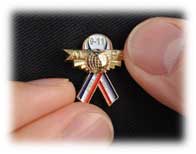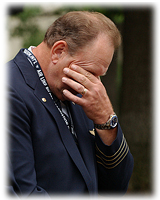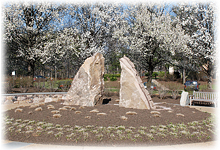 “The call from the chief pilot that two of our
aircraft had been hijacked, the knowledge that the flight crews on board
Flights 175 and 93 were JFK-based pilots, three of them members of Council
52, ‘my guys.’”
Read more.
“The call from the chief pilot that two of our
aircraft had been hijacked, the knowledge that the flight crews on board
Flights 175 and 93 were JFK-based pilots, three of them members of Council
52, ‘my guys.’”
Read more.
— Captain Mark Seal, United
“The moment the second plane hit the second
tower, I said out loud, ‘This is going to be the longest and hardest thing
that this country has ever had to do.’”
Read more.
— First Officer Bill Hughes, AirTran
“The discussions among
the group were no longer about how this happened, but how we could get down to
New York and help. The same sense of service that was the underpinning of our
volunteering to represent pilots on safety was now a source of torment as we sat
helplessly on the sidelines, hundreds of miles away and across an international
border that would soon be closed.”
Read more.
— First Officer A. David Eiser, AirTran
“Then we realized exactly how it happened as
United came barreling into the second tower, in real time. The room erupted
into pandemonium, shock, and disbelief. Of course, everyone went running for
the phones, and as my wife answered the phone, expecting her ‘happy
birthday’ call, I explained that her birthday might be a little different
from here on out. . . Never forget? How could we?”
Read more.
— First Officer Camm Willener, Delta
“Sometime after boarding, the captain made a PA that they had just heard
that two aircraft had flown into the World Trade Center and they believed
that the Pentagon had just been bombed. He went on to say that the airspace
was closed and therefore the flight was cancelled.”
Read more.
— First Officer Lisa Davis,
Jazz
“We looked at each other (10 or so of us in that room) and knew at that very
instant that the world of aviation—and the whole world that we knew, for
that matter—had just changed dramatically. The impact of that realization
was so violent that no one spoke for quite a while.”
Read more.
— Réal Levasseur, ALPA Safety and
Security Representative
“While talking to the dispatcher, I saw the second aircraft hit the World
Trade Center on a television in Ops. I asked the dispatcher if he had a
television in the office, and told him to turn it to CNN. He saw the replay
of the impact and said, ‘Oh my God.’”
Read more.
— Captain Glen R. Cernik,
Continental
“It was day four of a four-day trip and all we had to do was go to N.Y. then
back to Cleveland and were finished. We were en route hearing the normal
radio chatter. Cleveland Center was trying to reach a United 93 flight as we
were passing over Ohio and Pennsylvania.”
Read more.
— First Officer Troy Holladay,
Continental
 “(M)y F/O and I decided to walk toward the towers, not knowing what was
going on. On the way there, all traffic was stopped. We heard car radios
talking of terrorist attacks. We heard that the second tower had been hit,
but no real details. Just then, we heard the whine of two jet fighters in a
high-speed turn over the city.”
Read more.
“(M)y F/O and I decided to walk toward the towers, not knowing what was
going on. On the way there, all traffic was stopped. We heard car radios
talking of terrorist attacks. We heard that the second tower had been hit,
but no real details. Just then, we heard the whine of two jet fighters in a
high-speed turn over the city.”
Read more.
— Captain Craig Warner,
Continental
“Our flight from Bradley took us down along the west side of Manhattan where
the smoke was still rising from Ground Zero. The captain made a very
appropriate and emotional PA with that sight available off the left side of
the aircraft. This was one of my more memorable flights.”
Read more.
— Captain Steve Brodersen, Delta
“There had to be 30 people squeezed into a tiny briefing room. Just as a
picture came up, the first image was of the second plane hitting the second
tower. We were all aghast.”
Read more.
— Captain Roger Valentin,
Continental
“Unable to return home to my law enforcement
job, I was able to hitch a ride on a General Electric Challenger jet with
FEMA employees and cadaver dogs. . . We were one of the few aircraft exempt
from the no-fly rule after the 9/11 tragedy. Approaching KHPN, I could see a
thick haze rising up from the World Trade Center site. Being a lifelong New
Yorker, the New York City skyline looked so different after that day. It was
a sight I will never forget.”
Read more.
— First Officer Charles Castioni, CommutAir
“I had just gone to sleep after flying the night shift. My parents
called, waking me up and alerting me to the horrible live coverage. I was
dutied to fly 9/11 night, with special essential government approval, but it
was impossible to get fuel. I did, however, fly on 9/12 with only a few
other aircraft, mainly military. It was a solemn feeling, hearing the
silence on the radio.”
Read more.
— First Officer Jason Tabor, United
“I put on my jogging gear and headed for Times Square. As I ran over
there, I could see the smoke from the damage, mostly white, like a low-lying
fog bank over lower Manhattan. The island was already becoming eerily
quiet.”
Read more.
— Captain Chris Hayes, Delta
“Back at home later that afternoon, my two children were beginning to
understand the immensity of the events of the day. An overwhelming fear had
finally shaken my oldest daughter and she held on to me and sobbed. I knew
in that moment that those cowards had hurt my family, shaken their security,
and put fear in their minds for the sake of their father, an airline pilot
who, save for his schedule, may have been in one of those airplanes.”
Read more.
— Captain Lawrence J. McDonough, United
“What I witnessed was, to say the least, shocking, disappointing, and
frustrating. . . Shocking for the shear brazen boldness and magnitude.
Disappointing that we had no defense and we let this happen. Frustrating
because as I watched it unfold I knew, and said, that we were at war and I
was in a hospital—a Navy Reserve officer with no chance to jump in to fight
this enemy.”
Read more.
— First Officer Kevin Baum, Delta
“For a moment I felt as though I had been
dropped in the middle of a Tom Clancy novel, but quickly the reality set
in—the reality of all the people who must have lost their lives. Were some
of them people I had known? Flown with? Loved?”
Read more.
— First Officer Rick Hayden, United
“After we parked on the ramp, the chief pilot came out and told us to
pack our bags, get off the plane, close it up, and go to the crew room. My
first officer and I looked at each other and thought, ‘Man, what had we done
now?’ It was in the crew room that we finally saw the horror of what had
happened in New York.”
Read more.
— Captain Dave Barkdoll, Atlantic Southeast
“The ride back into the U.S. was an eerie one—no chatter on the radio,
no contrails, nothing. ATC told us we were one of the very first aircraft
allowed back into U.S. airspace.”
Read more.
— Captain Bob Kruse, Delta
“I wonder if the collective images of the jets slamming into the World
Trade Center and the massive towers crumbling to the ground really do carve
out small pieces of my soul. Because it feels like it.”
Read more.
— First Officer Michael Paredes, Continental
“Terrorists used our workplace to fight their
battle on 9/11. Many military families have made huge sacrifices so that we
might go back to work and feel safe, continuing to do a job that we enjoy. I
couldn’t be more grateful.”
Read more.
— Captain Jack Boulton
“When we entered operations, we saw a television broadcasting the news
from NYC and realized the weather was severe clear and saw that
ever-ingrained image of one of the towers streaming a column of black
smoke.”
Read more.
— Captain Jack Casey, Delta
“Glued to the television, like the rest of the
country, we watched as his Guard friends escorted Air Force One to Offutt
field.”
Read more.
— Captain Jeff Alexander, United
“The urgency to get us on the ground was
apparent, and, frankly, we were relieved to land safely, not knowing who or
what might be aboard our aircraft!”
Read more.
— Captain Neal Nickerson, Delta
“I was hired by AirTran in May 2001, four
months prior to 9/11. I was doing an LGA stand-up month when the twin towers
fell, although I was home that day.”
Read more.
— Captain Jerold (Jerry) Schneider